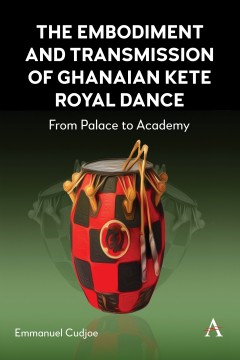The Embodiment and Transmission of Ghanaian Kete Royal Dance
From Palace to Academy
By Emmanuel Cudjoe
Other Formats Available:
- About This Book
- Reviews
- Author Information
- Series
- Table of Contents
- Links
- Podcasts
About This Book
The Kete royal dance, originating from the Ashanti people of Ghana, is a cultural treasure deeply rooted in the history and traditions of the Ashanti Kingdom. This dance form, once exclusive to royal courts, has undergone a transformative journey, transcending its palace origins to find a place within academic settings.
The history of the Kete royal dance dates back centuries to the Ashanti Kingdom, where it served as an integral part of royal ceremonies, festivals, and courtly events. Originally performed exclusively for Ashanti kings and queens, the dance symbolized royal prestige, spirituality, and cultural identity. Over time, the dance gained recognition beyond the palace walls, becoming a symbol of Ashanti cultural heritage. Kete dance is a language in itself, with each movement conveying a specific message or emotion. The dance communicates narratives of Ashanti history, spirituality, and societal values. Intricate footwork, hand gestures, and facial expressions are meticulously choreographed to tell stories, celebrate victories, or express reverence. The communicative power of Kete lies in its ability to transcend verbal language, conveying rich cultural narratives through the physical language of dance. In recent decades, Kete dance has transitioned from the exclusive domain of the palace to academic institutions. Dance scholars, educators, and students have recognized its cultural significance, leading to its inclusion in dance curricula. From an Afrocentric perspective, this volume discusses the transmission of the dance to the academy and in the diaspora. It highlights not only the teaching of the physical movements but also how heritage is imparted through specific cultural and generational contexts, historical narratives, and symbolic meanings embedded in Kete.
Reviews
“Cudjoe has written a well-nourished text that speaks to the incredible creativity enclosed in the traditional dance of the royal court of the Asante people of Ghana. This book will be used for many years to come. His arguments are compelling, and his writing is both fresh and victorious.”—Molefi Kete Asante, College of Liberal Arts Temple University
“The author brings a triple experience to this work. First, he grew up as a royal Kete dancer, instructed to ‘walk as a royal,’ and to display that royalty in the Kete dance with pride, becoming the center of attention, with music ingrained in the heart, mind, and spirit. Second, he has experience as a dance teacher, and third, as a researcher. This combination not only opened avenues for research but also allowed the author to adopt mythologies that benefit from interviewing dancers and musicians, as they relive their conscious experiences as royal performers and dance experts. This approach enriches the examination of the structural intricacies of Kete dance forms.”—Alhaji Abdulai Iddrisu, Chair, History Department, St. Olaf College, Northfield, MN
“In The Embodiment and Transmission of Ghanaian Kete Royal Dance: From Palace to Academy, Dr. Emmanuel Cudjoe offers a groundbreaking Afrocentric exploration of the kete music-dance tradition of Asantes from the Ashanti region of Ghana. This work reclaims the agency of the black dancing body and highlights its crucial role in generating and transmitting African indigenous knowledge systems. The book stands as a testament to the power of music and dance as repositories of knowledge and catalysts for social change. Through in-depth research and expertise, the author seamlessly weaves together theory, history, and practice, making this book an essential read for scholars, practitioners, dancers, and cultural enthusiasts alike. It is a timely and vital contribution to the field of African Dance Studies.”—Kofi Anthonio, Dance Studies Department, School of Performing Arts, University of Ghana, Legon
“This book is an extraordinary contribution to the discourse on African dance and movement. This book brilliantly illuminates the Kete dance-music as a profound cultural and analytical framework. Through meticulous exploration, it validates the black dancing body as a dynamic vessel of indigenous knowledge and a pivotal force in the global cultural emancipation of African traditions. This work is an essential read for anyone invested in the reclamation and celebration of African movement systems in the 21st century, offering critical perspectives that resonate deeply with scholars, dancers, and cultural enthusiasts alike.”—Eric Awuah, Anthropology Department, University of Alberta, Canada
Author Information
Dr Emmanuel Cudjoe is a tenure-track Assistant professor in Dance at Ball State University, Theatre and Dance Department, Muncie, Indiana-USA, a researcher, dancer, educator, cultural consultant, and African dance scholar hailing from Ghana.
Series
Anthem Africology Series
Table of Contents
Links
Stay Updated
Information
Latest Tweets



